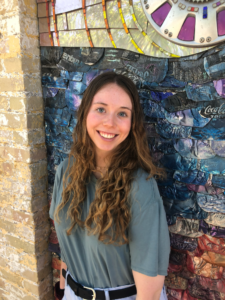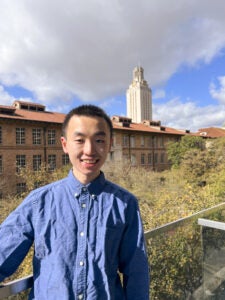


(From left to right: Olivia Conway, Aniket Sanghi, Kevin Zhou)
Three undergraduate students from the College of Natural Sciences have been awarded the 2022 Barry Goldwater Scholarship, a prestigious national scholarship given to students pursuing careers in the natural sciences, mathematics, and engineering fields. Olivia Conway, Aniket Sanghi, and Kevin Zhou are among 475 college students from across the country to receive the scholarship for the 2022 competition.
Scholars are selected for their commitment to research, effective display of intellectual intensity, and potential for a significant future contribution to research in their chosen field.
Olivia Conway, a junior biochemistry and plan II major, was selected for her independent research project focused on investigating the relationship between dysregulation of the human helicase protein senataxin (SETX) and the formation of toxic TDP43 aggregates in a model of human neurodegenerative disease. The results of the cell growth assay showed that truncated TDP43 constructs partially rescued growth in SETX-TDP43 double knockdown cells and the aggregation assay confirmed that truncated TDP43 forms aggregates. Olivia is working to identify a more sensitive method to quantitate the differences between double and TDP43 single knockdown cells.
Aniket Sanghi, a junior astronomy and physics major, was selected for his research summary of the results from his work on providing the first demonstration of reference star differential imaging (RDI) in exoplanet imaging with the Hubble Space Telescope (HST). Aniket applied RDI, a mechanically easier technique, to HST images of the star PDS 70 to uncover the protoplanet PDS 70 b. The technique demonstrates HST’s tremendous potential to accelerate protoplanet discoveries in promising new contexts and further our understanding of planet formation.
Kevin Zhou, a junior chemistry major, was selected for his research investigation to optimize the energy efficiency of a photoredox catalyst, zinc tetraphenylporphyrin (ZnTPP), for use in light-based 3D printing. This research indicated that the least absorbent wavelength, 656 nm, was 100-fold more efficient than the most absorbent wavelength, 420 nm. In the future, Kevin hoped to continue this study by investigating whether the optimized resin can be used for biological 3D printing applications such as 3D printing scaffolds for bionic coral
Olivia, Aniket, and Kevin will each receive up to $7,500 to help cover costs associated with tuition, mandatory fees, books, room and board.
Readers can go here to read more about the Goldwater Scholarship and how to apply.